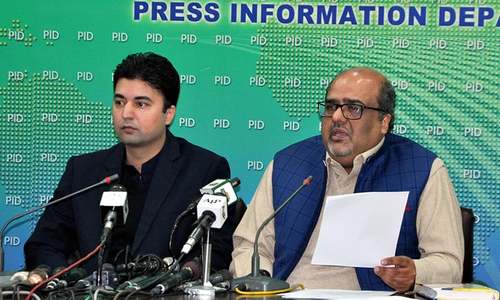ISLAMABAD: After smooth sailing of the three key bills on tenure of the services chiefs through the parliament, the government and the opposition on Wednesday agreed to discuss and build consensus for legislation on other important matters including the powers of the National Accountability Bureau (NAB).
As a first step to shun their differences causing delay in the legislation process, teams of the government and main opposition sat together for the first time in the chamber of National Assembly Speaker Asad Qaisar in the parliament house to forge consensus on five different bills including National Accountability [second amendment] Ordinance-2019.
“We sat for the first time to discuss the five bills, including NAB ordinance with Speaker Asad Qaisar in the chair,” federal Minister for Science and Technology Fawad Chaudhry said while speaking to Dawn.
He said the second meeting of the government and the opposition representatives would take place at the same venue on Monday. “It’s a good sign that members of treasury and opposition benches are sitting together to resolve pending issues,” he added.
The minister said the two sides would try to make unanimous legislation on the recently promulgated five ordinances which were withdrawn on the insistence of the opposition and it was decided that they would be converted into bills and presented before the parliament for approval.
The bills included: Letters of Administration and Succession Certificates Ordinance, 2019, Enforcement of Women’s Property Rights Ordinance, 2019, Legal Aid and Justice Authority Ordinance, 2019, Superior Courts (Court Dress and Mode of Address) Ordinance, 2019 and the National Accountability (Amendment) Bill, 2019.
On Dec 27 last year, President Dr Arif Alvi had promulgated an ordinance making some significant changes to the 20-year-old NAB laws to give maximum protection to the bureaucracy and business community.
Prime Minister Imran Khan had said the new ordinance would “insulate the business community” from the scrutiny of anti-graft watchdog after which the federal cabinet also gave approval to the ordinance.
The National Accountability Ordinance (NAO) 1999 has been amended keeping in view of frequent complaints from the bureaucracy that the government officers had refused to sign official files due to fear of NAB’s actions. Similarly, the business community had also complained that due to NAB’s undue actions, businessmen and industrialists had suffered losses and were reluctant to make any investment or take initiatives.
It is believed that the ordinance has made NAB a ‘toothless’ body.
One of the significant aspects is that if cases of relevant organizations were sent back to them for an action, they [the cases] will be dealt by relevant laws of those departments and not under NAB laws.
Similarly, the ordinance curtailed certain powers of the bureau’s chairman and Pakistan president including the power to appoint NAB prosecutor general. The power to appoint the prosecutor general for accountability was recently given to the federal government.
Published in Dawn, January 9th, 2020














































